This is my eighth post of quotations about creativity, creative people, and the creative process that I’ve assembled from my reading and writing. These quotes are valuable because writers, artists, photographers, and actors and other performers have expressed interest in them. They are interested in them because insights into creativity and the creative life can be applied to their work, bring them inspiration, and increase their knowledge and skills, enabling them to produce increasingly better, more sophisticated, and more popular work. That is an urge to improve and excel that animates almost every creative person from the first morning of the first day of their creative life to midnight of the last.
An important reason a creator hungers for information like this is the competitiveness of fields requiring inventiveness: painting is exceptionally competitive; writing and acting are too, and the creator is looking for an edge. Even one idea from these posts may lead to a creative breakthrough that strengthens the creator’s competitive position.
Persistence
The first thing a creator has to learn is not to quit. Have you thought of quitting? The majority of creators quit. They quit because they think no matter what they do they can’t succeed. But that can be overcome. The ideas in this post may help. What they need are new insights showing them that success comes from within a healthy, creative mind and is feasible for them. Then they have to also learn not to be mediocre. Most people don’t want to be mediocre, yet are perfectly satisfied to be mediocre-plus. The quotes may help you not to quit and not to be mediocre. A creator must learn to persist, and then persist more, persisting if need be beyond what seems human capability.
Naturally much is made of a creator’s talent. Thomas Wolfe said about the need to put your talent to use: “If a man has talent and can’t use it, he’s failed. If he uses only half of it, he has partly failed. If he uses the whole of it, he has succeeded, and won a satisfaction and triumph few men ever know.” Almost all people believe that talent is the reason for creative success. But persistence–the art of refusing to give up–may be more vital to a creator’s success than talent. Teachers of the arts often state that the students who will fare best in creative life are not the most gifted but the students who are the most determined to succeed. If they are persistent, less talented writers may have more works published and make more money than the more talented. The same is true of painters. American Jack London received 600 rejections before his first short story was published. He was not considered one of the great writers, but after the publication of that first story he became the most popular writer in the world within one year.
Enlightened creators are confident of themselves and possess what I call “inner skills” that not every creator possesses, returning again and again tirelessly, almost maniacally, to their work. They overcome sometimes enormous obstacles and difficulties that would deter less powerfully persistent people. Painter Pierre-August Renoir’s hands were crippled and rendered useless by severe rheumatoid arthritis and he was unable to paint with them late in his career. But with a strong will he produced some of his greatest works after that lying on his back, painting with the brush between his toes. Even without such extreme obstacles, creative work can be exceedingly difficult. When creative work “goes painfully, when it’s hideously difficult, and one feels real despair (ah, the despair, silly as it is, is real!)–then naturally one ought to continue with the work; it would be cowardly to retreat” (Joyce Carol Oates).
If you are a creator with talent and persistence both, your prospects of success are excellent.
Intensity
Intense people are growing rare in this era. Something is weakening people. But creative people are different. They tend to live intensely, and have strong beliefs about their creative pursuits: “It is through art and through art only, that we realize our perfection; through art and art only that we can shield ourselves from the sordid perils of actual existence” (Oscar Wilde). That intensity of their emotions and sensitivities is a necessary part of their make-up. They think, feel, and imagine intensely. They are often overstimulated, and at any moment may be flooded with mystical waves of rapture and joy with a sense that every cell of their body is incredibly alive. “So far as the artist is concerned, the unlimited extent of human experience is not so important for him as the depth and intensity with which he experiences things” (Thomas Wolfe). “It is evident that a faith in their vocation, mystical in intensity, sustains poets. There can really be no greater faith than the confidence that one is doing one’s utmost to fulfill one’s high vocation” (Stephen Spender). The creator has to learn to harness that intensity and aim it to producing quality works.
Creators must have a hunger to experience, to feel deeply, to know, to self-disclose, sharing what they have learned, felt, seen, and heard with anyone who is interested. “The meaningful difference intellectually between one painter or writer or one actor or director and another is simply the number of things they are intrigued by in a square yard of their experience and the urgency of their hunger to express them”(David J. Rogers).
Risk-Taking
Creative works do not come cheap. In order to produce them, creative people, once as ordinary as dishwater, must reshape themselves and not be afraid to branch out into the insecure, the anxious, and the unknown, risking, daring. For the creator risk-taking is not fool-hardiness. It is essential. On what is a memorable creator’s life based if not taking chances because life is short, time is fleeting, and an art that burns inside the artist must be expressed or it will extinguish into nothing. Can you feel it: that hunch igniting your spirit that there is a passion there that has appeared in your writer’s, painter’s, or composer’s life that must be pursued to its conclusion no matter the cost to your time, personal life, or peace of mind? Picasso said that “one must act in painting, as in life, directly.”
Identifying Creativity
How can you tell if you are creative? The pursuit of ways to identify creative people has led to scores of tests. But it has not been possible to demonstrate that creativity tests are valid. “High scores on a creativity test do not signal that one is necessarily creative in one’s actual vocation or avocation: (Howard Gardner). The answer is in the work: Is it original? Does it have a use? Do your artistic peers and the public agree that it is creative? If so, it is creative and having produced it, so are you.
Life of Creators
Generally, creators’ childhoods have more impact on their creativity than any other period of their lives. “Early in life, the creator generally discovers an area or object of interest that is consuming” (Howard Gardner). Author John Updike said that nothing that happens to you after the age of twenty is worth writing about. If you knew in childhood what you loved doing and were relatively sure what you would be when you grew up, you were more likely than most people to be creative as an adult.
The creator’s life, being hard, is not suited to everyone. To succeed you have to be an exception from the norm. To become highly skilled in creative works takes many years of hard work that only a minority of people are equipped for. “The sheer labor of preparing technically for creative work, consciously acquiring the requisite knowledge of a medium and skill in its use, is extensive and arduous even to repel many from achievement” (Brewster Ghiselin). “Writing a book is a horrible, exhausting struggle, like a long bout of some painful illness. One would never undertake such a thing if one were not driven on by some demon one can never resist or understand” (George Orwell).
To live the life of an artist appeals to millions of people, many envious of artists who they think lead “glamorous, exciting” lives. But that life is especially difficult in ways that other lives are not. “The artist’s life cannot be otherwise than full of conflicts…There are hardly any exceptions to the rule that a person must pay dearly for the divine gift of the creative fire” (Carl Gustave Jung).
To accomplish something noteworthy in art requires that you sacrifice at least one other important activity, person, or goal. The hard and fast rule is: to get, you must give up. “A special ability means a heavy expenditure of energy in a particular direction, with a consequent drain from some other side of life” (Carl Gustav Jung). The artist must take time and think very carefully and decide what he/she is willing to give up. What shall it be–this or that?
Influences on Creative Output
Memory is the most significant key to the creator’s gifts. “The poet above all else is a person who never forgets certain sense impressions which he has experienced and which he can re-live again and again as though with all their original freshness…There is nothing we imagine which we do not already know… And our ability to imagine is our ability to remember what we have already experienced and to apply it to some different situation” (Stephen Spender). All creators in any of the arts and sciences possess this kind of memory.
Creative works are the products of the whole person: intelligence and courage, talents and commitments, and unceasing energy: “It is not what the artist does that counts, but what he is…What interests me is the uneasiness of Cezanne, the real teaching of Cezanne, the torment of van Gogh, that is to say the drama of the man” (Pablo Picasso). “I don’t care who the artist is, if you study him deeply, sincerely, detachedly, you will find that he and his work are one” (Henry Miller).
Creative Vision
Many artistic creations are a result of the creator playing with new possibilities that disregard and shatter society’s sometimes restrictive rules of decorum, conformity, and political correctness. Doing that may lead to a kind of liberation: Novelist Henry Miller wrote, “The world would only begin to get something of value from me the moment I stopped being a serious member of society and became…myself.”
The creator must never sacrifice his or her own vision, or water it down for the sake of acceptance, whatever the opposition to it or how out of the ordinary it may be, and must never be intimidated by anyone, or live in fear of anything for even a moment.
The artist whose beautiful work is featured in this post is Karin Goeppert (www.karingoeppert.com). She says, “Life is a largely subjective experience; but that subjective experience is my bridge to the objective world. And it’s this synthesis of the two that I am trying to capture.” She says of her inspiration and process: “I love experimenting and want to give my works an individual expression. Most of my works are abstracted from nature but I also do non-objective paintings. I am inspired by the beauty and power of natural phenomena, the mystery of nature, its colors and forms. Every painting is a one-of-a-kind work in which I try to combine feeling and thought.”
© 2018 David J. Rogers
For my interview from the international teleconference with Ben Dean about Fighting to Win, click on the following link:
Order Fighting to Win: Samurai Techniques for Your Work and Life eBook by David J. Rogers
or
Order Waging Business Warfare: Lessons From the Military Masters in Achieving Competitive Superiority
or

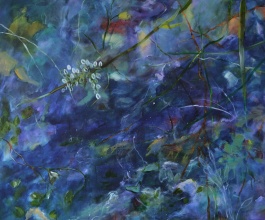
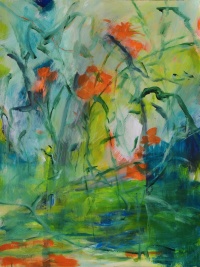
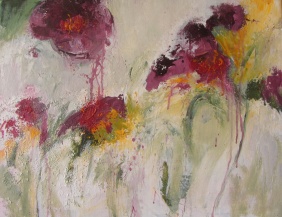
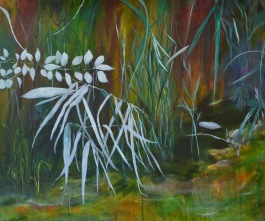
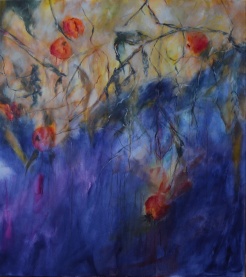
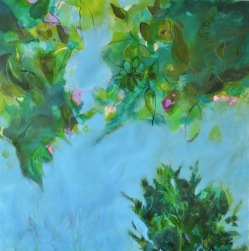


Thank you David once again for your insightful words beautifully paired with Karin Goeppert’s art which I found had an intriguing subterranean quality. As always I look for a specific message and action from your posts and I was bemused by the struggle between the number of things a creative person is intrigued by and the need to harness their intensity. And then the answer became apparent in your directive to never water down the vision and to move forward fearlessly. A timely message for us all I am sure when it is so easy to lose focus and become entangled in the impedimenta of modern living.
LikeLiked by 1 person
Dearest Michelle, I see that your mind is as always analytical and razor-sharp. You keep me on my toes. As to your observation, my feeling is, judging from the only mind I know extremely well–my own–that the creative mind knows no rest–is dreaming, trying to understand, groping, luxuriating in thought and in your case images and colors, and is some of the time a thousand miles away from everyday life, yet also capable of ferocious focus like the flame of an acetylene torch. You and I need a mind like that, and fortunately, have one.
You mention impediments of modern living. A samurai leader said, “Count your affairs as one or two,” and our American philosopher-naturalist-writer Henry David Thoreau advised, “Simplify, simplify, simplify.” My approach is to build walls between myself and a world of secondary diversions that I haven’t the slightest interest in, which is how it is for creative people, though everyone around me is absorbed in them. Diana is the go-between between me and it and keeps me posted on what is going on out there. I’m not a complete recluse, but I guard my time and attention to devote to my work. You and your roses and your skills–that’s a grand world in itself, and me and words is also a grand world in itself.
I’ll soon be off to look at your new newsletter and I can hardly wait.
Wising the best for you,
David
LikeLiked by 2 people
Thank you very much, Michelle.
Karin
LikeLiked by 2 people
Good morning David.
I received notice of this post in Portugal whilst tutoring a superb group. I will re-blog and so am hoping that they will read it.
I don’t usually get time for much else during these workshops, because as I am sure you are aware they are full on, but in this instance I did take the time to read your post….and as always it was just what I needed.
More than anyone else I know, you put into words exactly what goes on within a creative’s mind and being. I often think if only parents of children who know from a very early age that they will follow a creative path could read your work how much it would help both parent and child to navigate a life filled with intensity, peace, turmoil, risk taking and sacrifice. Understanding that there are ways to harness the intensity, so that it works for us rather than against.
I loved all the quotes, including yours. George Orwell’s really spoke to me at this time. Something you wrote a short while ago, along with another recent incident has triggered a huge surge of energy in writing the book I have been talking about for some time. Oh yes, I have been writing copious notes for years, but nothing seemed to work…..and then as I say two triggers, including your words have given me a great boost. However, I can already see that this will be a long and painful journey in many ways…one in which I hope to complete before i move onto the next zone:) I will keep you appraised.
I do so agree with the necessity of persistence and determination for any creative. I have known some extraordinarily creative painters, writers, but they never get out of the gate simply because they give up….they can’t follow through.
Anyway David, I will be sending this post to quite a few people and re blogging…..Thank you once again my dear friend for such powerful words.
My best wishes to you
Janet
LikeLiked by 2 people
Dearest Janet,
You are much on my mind, thinking of what you mean to me as a friend and sympathetic human being who is, like me, committed to creating, and so loves it she won’t be deterred. I’ve thought of you in Portugal and know you are happy and fulfilled there. I appreciate your bothering to look at my work even though you are very busy.
Now I will think of you finishing the written work of your life. The book will be great because you have so much to tell us about and you write like a dream. I can hardly wait to read it. Meanwhile, if I can be of any help to you in any way just let me know, please. I’m sure Diana will say the same.
Your words are so pleasant and kind to me. They give me chills of satisfaction. I’ll be sending the paragraph beginning “More than anyone else” to my children and of course Diana will be moved by it.
You are my dear friend too. One day we will meet face to face. You are my barometer more than anyone else, I trust your judgment so. If I feel you like one of my posts especially well, then I’ve succeeded. For you to reblog my work again and send it to your friends is the finest compliment I can receive. Thank you for your generosity.
Best wishes,
David.
LikeLiked by 2 people
Good afternoon from London. Thank you so much for your response and especially for offers of advice, which no doubt I will need as I get into the book.
Portugal was superb and the group just wonderful. I had four Australians – two from Perth and two from Sydney – all of them so much fun and good artists…and a lovely couple from Iceland. Maria is a painter and her husband John added so much to the group. Definitely makes me want to visit Iceland….Then there was a lovely Irish girl, a man from Cyprus and the rest from the UK…total of 14, including me.
The plan is to write my first blog about the trip on Tuesday.
I have passed on your post to quite a few people as I believe what you say is something that so many never really hear or understand. I think that this recent post and many others could help those who maybe doubt themselves, or in the case of a parent of a creative…might feel overwhelmed…thinking that their child’s behaviour is out of the norm! To understand that this is the way a creative’s mind works….is so important. Again, thank you very much.
Yes, I am quite convinced that we will meet in person one day…maybe when you and Diana visit Wales….now wouldn’t that be fun.
Enjoy the weekend. We have lovely cool, sunny weather in London, which after very hot and sunny weather in Portugal is somewhat of a relief.:)
Best wishes to you my friend.
Janet
LikeLiked by 2 people
Janet, thank for your description of your Portugal group. They seem like such nice people to study and practice with. I look forward to your post about that experience, and I thank you for your vote of confidence about my approach to writing for people in the arts.
Let me tell you what Diana and I will do today. With our son Eli and his wife and children (including his son Meir–your little artist friend), we will go to the next suburb north of us to carve pumpkins for Halloween. Eli’s wife is a master carver. Thousands of people will converge on that little town to carve thousands of pumpkins in an annual competition with a sister little town out east. Whichever town carves the most pumpkins wins. Our little town loses every year. We go every year and are often joined by two other of our children and their children who live around here. (We have another daughter in Colorado.) We take knives in hand and dig in. There will be parades, rides for the kids, refreshment stands everywhere, politicians wandering about shaking hands and making promises that they won’t keep. pony rides, maybe camel rides, porto-potties, open restaurants, ice cream, hot dogs, but mainly people of all descriptions everywhere. We always have fun.
Just yesterday I had an idea for a new book for writers and artists I hope to write. I already have another book in the works. I scoped the new book out and typed up a basic pan. I bounced the idea off Diana, my guide whose judgment I trust implicitly. She likes it and says I should get going on it. I’m excited and happy, actually breathless, just as I know you are excited about your book project. My mind is frazzled. It’s in that pre-compositional lilt I’ve written about.
I hope you have a good day and night. I will talk to you soon, I’m sure. Thanks again for promoting my work, friend.
David
LikeLiked by 3 people
Huge smiles all over my face thinking of you and family carving pumpkins…It sounds like a wonderful festival.
I can hear that pre-compositional excitement in your writing….Absolutely fantastic and aren’t you fortunate to have someone like Diana by your side – and I am so fortunate to count you both as friends.
Off to write blog for tomorrow….talk soon.
Janet
LikeLiked by 2 people
I forgot to mention how much I enjoyed Karin Goeppert’s work. Thank you for the introduction. Janet
LikeLiked by 1 person
I think Karin’s work is excellent and beautiful. I’m sure she will be happy with your comment.
David
LikeLiked by 2 people
Dear Janet, thank you very much for your kind words. I appreciate it. Thank you, Karin.
LikeLiked by 3 people
David, your insights are profound, my friend. I always thought it was odd that I “hunger for information.” Now I understand. The characteristics you listed are spot-on.
Karin’s artwork is breathtaking. Many of these are so… ethereal. Vinci and Waterborn had me imagining nature-based phantoms, akin to yet alien to faeries — and what double-edged havoc they could wreak as they remade the world in their image. Okay — I’ll stop. Back to work.
Hugs on the wing!
LikeLiked by 1 person
Dear Teagan,
Such lovely compliments for Karin and me. Thank you, friend, for both of us. Even in your comments on a post, your imagination shines forth. You’re something!
Hugs to you as well,
David
LikeLiked by 1 person
Dear Teagan, thank you so very much for your nice words about Davids writing (by the way, I completely agree with you) and your words about my artworks. I really appreciate it. Thank you. Karin
LikeLiked by 2 people
Dear David, It is so lovely to return and read your writing again. You paint an interesting picture of the creative process and creative people, which I believe concentrates at the end of the spectrum – the obsessed, single focused and tormented (at times) artist. My interest is more in the other end of the spectrum, but maybe that’s because I’m a woman :). For me, creativity is a human characteristic – we’re all creative in one way or another, but we’re not all artists. Is the torment you describe because artists have to earn a living from it? If you don’t have to earn a living from your art, is it still a torment?
I love your quote, that describes the difference between one artist and another as ‘…simply the number of things they are intrigued by in a square yard of their experience and the urgency of their hunger to express them.’ That. I think, describes creativity perfectly – the extent of your curiosity about the world, the questions you ask, and the answers you come across. I find so many things and people interesting, and my great joy is to write about interesting things. I’m not an artist because I’m such a dilettante, but I do engage in creative pursuits, happily 🙂
LikeLiked by 1 person
Hello Sara.
Thank you for your interesting comment. I think that it’s true that many everyday creative people who become involved in the arts become almost completely absorbed in their work. I am absorbed. But they are not so absorbed that they are ill. They have a powerful and constant need to write, or paint, act, dance, compose, etc. I would not say these people are tormented, but yes obsessed, addicted in a healthy way (there are healthy addictions) to making something, and to expressing and shaping.
I remember our talks about whether Sara Foley is an artist and your reluctance to call yourself that. Remember? Your writing is spontaneous–I can tell. There is art in it, and it is very enjoyable. That curiosity about the world you talk about is in you and your writing.
Best wishes,
David
LikeLiked by 2 people
Dear David, you are quite right! We have indeed picked up this conversation from where we left off 🙂 I guess my passion doesn’t necessarily lie in creating things (although I am currently loving creating crocheted mandalas, but that’s another story 🙂 ), but in understanding. I love sociology and history and psychology and science and spirituality because they all explain something of the world and its humans. That’s why I write – to understand and to communicate that understanding – and why I have no attachment to what I write. And why I don’t consider myself an artist, or under the obsessive refining of a single craft. And, this conversation has helped me understand something of myself, so for that I thank you! Your friend as ever, Sara. PS I hope you didn’t find me too blunt – the flipside to my obsession with understanding is being understood, and sometimes I’m too blunt in that process. If so, I apologise ❤
LikeLiked by 1 person
Dear Sara,
I can tell that you love learning and love communicating what you’ve learned, and I like your idea of writing to understand.
Just a few hours ago my wife Diana (a very bright woman) and I went out to lunch and talked about how when we were children we each read encyclopedias. Like you, I’ve always loved learning. Fortunately for me I have an exceptional memory and remember much of what I’ve been exposed to.
No, I didn’t for a moment think you were too blunt. I think you have an image of great artists being extreme in the lives and not like more normal people. I think they are people pretty much like everyone else in most every respects (accountants, teachers, sales people, clerks, etc.)–except one, their art. There they are distinguished from everyone else by being quantum leaps more intense and extreme than people in other pursuits. Why not, they are in love.
You know that you are an artist when you find a certain pastime different from anything else you’ve encountered, mystical, and all-consuming in the act of creating that takes hold of your soul, and then, never, never lets loose until you die.
Best wishes,
David
LikeLiked by 1 person
Thank you, David, for prompting me to look up this post. I see that I have missed many of your recent posts on my feed, so perhaps I need to also sign up to get notifications by email. I enjoyed this posts. It was interesting to see the themes that were repeated by the various quotes. At first I thought I was the exception to the rule about how a creative person often knows as a child what path they’re going to pursue in life. Thinking back on my childhood and youth, I never verbalized or even had the thought, “I want to be a writer.” WHen I went to college, I didn’t know what to major in. I thought I might be a missionary. I discovered political science the third quarter of my freshman year and loved it. My career before health issues began was in local government. I remembered, though, that I kept extensive journals as a teenager. It seems that writing has always been an important part of my life, but it took me until middle age to recognize it as a vocation. Interesting post, David!
LikeLiked by 1 person
Janet,
You have had an interesting and circuitous path to writinghood, but here you are, now what you probably always were meant to be without you knowing it: a novelist hard at work. My career was different. I knew in the fourth grade that I would be a writer–came home from school and told my parents that’s what I would be when I grew up–and everything thereafter was aimed at education and training for that goal. I began earning my living though writing very young.
I’ve been thinking about you that you might wish to publish a post on some of your writing in progress these days. That way I could see a bit of what your creative writing is like.
Thank you for your comments and interest in my work.
Best wishes.
David
LikeLiked by 2 people
David, I thought I had replied to you, but I see now that I haven’t. Sometimes I’ve wished I’d figured out the writer thing at a young or younger age than I did, but then I realize I wasn’t ready earlier to write fiction. My life experiences have taught me a perspective that I didn’t have as a teen or young adult. Thank you for suggesting that I post some of my writing in progress in my blog. I’ll try to do that in the coming weeks. I have my post topics planned and partially-written for the next six weeks or so, but I’ll see how things go.
LikeLiked by 1 person
Janet, I understand your regret that you got a late start in serious writing. I did a study once of later bloomers and found that while they get a late start they almost always “catch up” and surpass their contempories who started early. They make their mark though it is late in coming. I’m glad you’ll be putting some of your creative writing on your post.
Best wishes
LikeLiked by 2 people
Thank you, David.
LikeLiked by 2 people
You’re welcome.
LikeLiked by 2 people